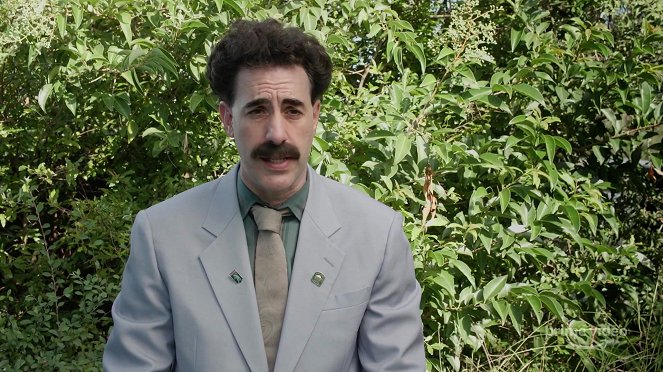Directed by:
Jason WolinerCinematography:
Luke GeissbühlerComposer:
Erran Baron CohenCast:
Sacha Baron Cohen, Maria Bakalova, Rudy Giuliani, Tom Hanks, Jason Woliner, Rita Wilson, Mike Pence, Stephen Stanton, Anis DorofteiVideos (2)
Reviews (9)
I definitely appreciate about half a dozen of the film’s truly funny and imaginative gags and scenes, but otherwise it's quite weak, especially compared to the excellent, first Borat. Confrontations with "unsuspecting" Americans (who are surprisingly resigned this time around and put up with everything) are unfortunately dull, sometimes giving the impression of artificial staging and especially the desperate need to involve them in a poorly directed, convulsive and unfortunately broken plot about the relationship between a father and his daughter. As long as Cohen is provoking people while wearing bizarre costumes, the film works, but as soon as the scripted actions take place, or if anyone else is on the screen, the film immediately falls off the rails. The film only has sporadic quality satire and is otherwise mostly a relatively standard comedy with borderline humor and plenty of dead spots.
()
The beginning and ending in Kazakhstan are great, but everything in between is rubbish that touches on simmering social issues, but through an unimaginative plot structure and silly, unfunny humor. And it seems that no one even attempted to employ the “hidden camera” effect that made the original Borat great.
()
"I found a new book which only tells truth. It's called Facebook." Despite its cult status, the first Borat didn't quite get me as excited as many viewers, but I still saw it as an aptly ironic comedy that didn't mince words on any front. The sequel appealed to me in much the same way, though its atmosphere shifted more into the waters of the drama-family genre, but still with an unmistakable ironic-critical tone. Sacha Baron Cohen as Borat is once again insane, making fun of Trump, the coronavirus, Americans, Jews, women, feminists and many others, which he does brilliantly in places, and a little less so in others. Borat 2 is a textbook example of a film for which I can understand any rating!
()
The second Borat is an overblown PR bubble as well as a movie that was hastily slapped together in an effort to coast on the moods of pre-election America. As Sacha Baron Cohen himself admits, he could not go back to the same well a second time simply because people already knew the Borat character. Therefore, the second film is built to a far lesser extent on confrontations with unsuspecting people who reveal themselves vis-à-vis the caricature. It rather relies mainly on a screenplay with a traditional narrative structure and the clichéd dramatic arc of the main characters, which only becomes overwrought through repetitive jokes. Paradoxically, the second Borat gives the impression of being a rapidly fermenting copy of Cohen’s chilling masterclass in Who Is America?. Though he again wagers on ratcheting up the awkwardness, in most situations, unfortunately, confrontational provocation remains only wishful thinking. It is obvious that Cohen has to try really hard to draw something usable out of the situations, but that does not prevent the PR department from spinning a carousel of spectacular claims (the apex of futility is the attempt at fomenting a scandal with Giuliani). The Borat character and the attempt to bring unnecessary dramatic consistency to the film repeatedly prove to be its main hindrances. Cohen’s need to maintain a trace of the Kazakh dolt in his new prankish alter egos by means of an accent undermines a number of scenes by limiting the potential for provocation. If Borat’s first look into American culture brought forth a lot of frightening and disturbing revelations about the American character, the return of the self-proclaimed reporter shows only a country in a state of lethargy, where even the greatest provocation will be met only with silence and raised eyebrows. The clown lost his power derived from placing a mirror in front of the country, because during his absence, America itself chose a much grimmer clown as its president and the essence within America, once previously revealed with shame, was transformed from the grotesque dark side into the norm of social discourse. It is also appropriate to note that infotainment also underwent a change during that time and that confrontation leading to throwing off façades is now a common or rather frequently updated part of journalistic comedy programmes such as The Daily Show and The Opposition with Jordan Klepper. However, that does not mean Cohen’s style of ultra-awkward confrontations has lost its effectiveness, as was confirmed by the outstanding Who Is America? project. Borat itself, or rather the transformation of its purpose, is what stands in the way. The first film occupied the plane of confrontational malice with carefully selected targets. The second film becomes a desperate slave of the narrative line, which has the consequence of preserving the dysfunctional and obviously unsuccessful pranks (the entire sequence with a fax machine, the uber driver, etc.), which previously would have wound up on the cutting-room floor or the film’s creators would have tried to stage again with other victims, if they hadn’t had a release deadline before the American elections. Cohen’s activistic agitation paradoxically drags the film to the bottom. It also brings into it an element of unnaturalness and staging, which is manifested in the well-meaning sequences of the touching humanisation of Borat and his daughter (babysitter and synagogue). The general proclamation that Borat’s return offers necessary relief for these times, thus (in addition to accepting pre-formulated claims) rather reflects an even more desperate state of the culture and society than Borat can uncover. There are flashes of that in the film and something could happen, but that would require completely reworking the concept and, mainly, rejection of the predetermined storyline. We thus go back to the beginning for confirmation that, unlike Cohen’s aforementioned series project, this film is not about America, but only about Borat, who has gone from being a functional catalyst to a dysfunctional character.
()
(less)
(more)
The first half is great: brisk, funny, politically incorrect enough, and original, but then comes the unusually stagnant filler, with the characters just moving around and boring emancipation bullshit that only someone as bold and original as Cohen could get away with. Things get back on track in the last ten minutes, which prove that this film is at its best when it relies on individual clips and gags, which isn’t that good for a feature film threading political and social insight. 65%
()



Ads